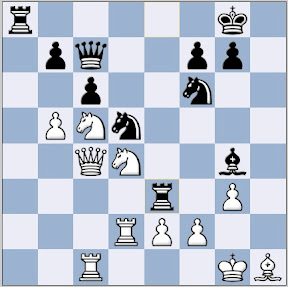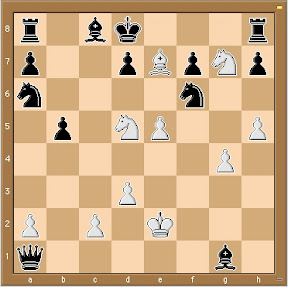I spent a fair amount of time looking for good layouts, so it's nice to hear that they are appreciated.
Unfortunately, I couldn't find any automatic software that generated position diagrams I liked, so I've had to resort to grabbing screen shots from favourite chess software.
The blue diagrams are screen shots from Buho21, a free online chess server with a very clean interface. They use a font for the chess pieces called Merida.

Recently, I've switched to some brown diagrams using screenshots from Sigma on the Mac. This was purely by chance: my Windows PC power supply packed up and I hadn't realised I could also run Buho on the Mac.

Having set up the positions, I grab the screenshots, move them into Google's Picasa, and finally into Blogger.
Ok, now the quiz (a difficult one), the positions on the boards are from which 2 famous chess games? Answers to roger AT 21thoughts DOT com. Also let me know if you prefer the blue or the brown diagrams.

4 comments:
I like the brown ones :-)
So Roger, what's your secret? what did you do to become a 2000+ FIDE rated player? Besides playing in FIDE rated tournaments i mean.
I mean, if i would like to go anywhere with my attempts at improvement, a 2000+ FIDE rating would be kind of like a goal. So any tips would be welcome.
Hi Edwin,
I'd love to have an easy recipe for picking up rating points, wouldn't we all!
A few thoughts on things that worked for me:
1. Play, play as much as you can
2. Confidence, believe in yourself and always look for the winning opportunities in any position
3. Know the key strategic ideas / long term plans in your favourite openings
4. Don't get swamped in theory, a few well understood lines is better than a head swimming with variations
5. Books that have definitely added points to my rating include Gallagher's "Beating the Anti-King's Indians" and particularly "Beating the Anti-Sicilians"
6. Shereshevsky's books on the endgame are also worthwhile, but currently out of print. As with the openings, learn endgame strategy and fundamentals rather than variations
7. I think DVD's (e.g. Kasparov's on the Queen's Gambit) are a great way to learn openings, and will replace books in the long run. We'll learn concepts from the DVD and search computer databases for detailed variations
8. Some of the new online video material should be interesting as well, although I haven't really checked many out
9. Finally for now, solve lots of tactics / mating positions
Maybe I should write this up in more depth as a series of posts!
Good luck, Roger
My chess recommendations on Amazon
Hi Roger,
I like the blue diagram best - I agree, it's a very clean interface.
Thanks for the improvement tips. It's interesting to hear an opinion on chess DVD's. I've never bought a chess DVD but I might be tempted in future. I suppose everyone learns in different ways and DVD's might be better than books for some people.
As for the puzzle - I haven't checked my answer on a database but the first looks like Alekhine (with the Black pieces) against Reti following the famous Re3 sacrifice.
The second looks like the finish of the 'immortal' game, Anderssen v Keiseritsky (spelling probably wrong!).
Hi Roger,
I am like Ryan and like the blue diagram too.
Recently, I met a young women who became addicted (her words) to playing chess tournaments online, so I am not sure recommending to play as much as you can without adding a word of caution to use moderation and self control. Chess can become an obsession. :)
You made a good point about not getting swamped in theory, and learning end games, my weak spot.
That would be great if you would write a short series. A lot of people would benefit from the experience you can provide.
Take care my friend.
Ray
Post a Comment